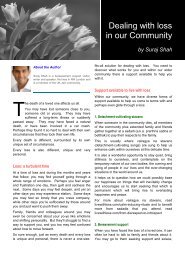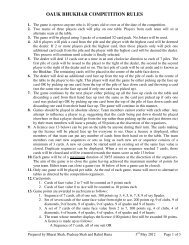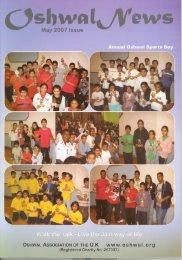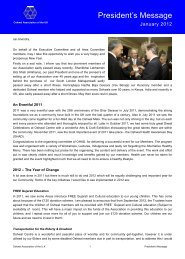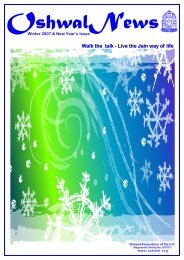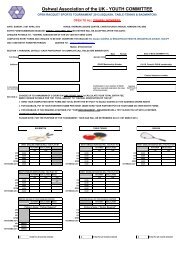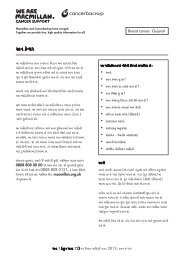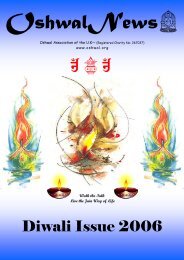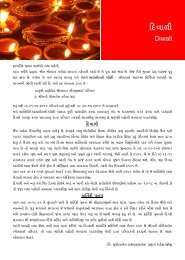Third Edition E-Magazine | April 2013 | www ... - Oshwal Centre
Third Edition E-Magazine | April 2013 | www ... - Oshwal Centre
Third Edition E-Magazine | April 2013 | www ... - Oshwal Centre
You also want an ePaper? Increase the reach of your titles
YUMPU automatically turns print PDFs into web optimized ePapers that Google loves.
~ Whose planet are we living on? ~<br />
I would like to propose that each individual can save the<br />
earth simply by saving one drop of water a day. Just<br />
multiply and work out the volume. And, if we take care of<br />
one drop, rest assured that we will THINK of protecting<br />
the environment in everything we do. IT IS the<br />
ATTITUDE.<br />
Let us not worry about what the GOVERNMENT WILL<br />
DO for the ecosystems.<br />
No Government is more powerful than the individual when<br />
each one acts with a single purpose in mind. This is why<br />
Mahavir preached this to the masses, in their own<br />
language.<br />
Let us make it a habit to THINK! Think of the<br />
repercussions on the environment of all our actions.<br />
‘Whose Planet?’ A very interesting question.<br />
Jainism believes that the universe is in existence from<br />
time immemorial and it is eternal. Its constituents can<br />
neither be created nor destroyed. It is according to the<br />
inherent qualities of the constituents that change takes<br />
place all the time.<br />
The planet is but a collection of ecological elements and<br />
life forms. Hence, the occupants are the owners of the<br />
planet. Do we not own our properties jointly with our<br />
spouses as ‘TENANCY IN COMMON’? Well the same<br />
applies to this planet; only the number of tenants is<br />
infinite.<br />
As ye sow, so shall ye reap! Or, what goes around<br />
comes around!!<br />
Bibliography<br />
1. Tattvàrtha Såtra, of Umàsvàti/Umàsvàmã. Translated<br />
as That Which Is with an introduction by Nathmal Tatia.<br />
San Francisco: HarperCollins Publishers, 1994.<br />
2. Acàràïga Såtra. Translated into English by Hermann<br />
Jacobi. The Sacred Books of the East, Vol. XXII , Part I,<br />
Pages 1-213. London: Oxford University Press, 1884.<br />
Delhi: Motilal Banarasidas, 1994.<br />
3. Såtrakçtàïga Såtra Translated into English by Hermann<br />
Jacobi. The Sacred Books of the East, Vol. XLV, Part II,<br />
Pages 235-435. London: Oxford University Press, 1895.<br />
Delhi: Motilal Banarasidas, 1995.<br />
4. Saman Suttam compiled by Sri Jinendra Varni,<br />
translated into English by Justice T K Tukol and Dr K K<br />
Dixit. New Delhi: Bhagwan Mahavir Memorial Samiti,<br />
1999 (1993).<br />
5. Various sources on the Internet.<br />
Article by,<br />
Dr. Harshad N Sanghrajka<br />
VISA OSHWAL COMMUNITY, NAIROBI<br />
Whose planet are we living in?<br />
February, 2011<br />
And in that joint ownership, do we not assume<br />
responsibility according to our skills? Well, we should<br />
apply the same principle to the planet. So, just as we<br />
would do it in commercial enterprise, we should assign<br />
the responsibility to the most apt. Let us humans assume<br />
responsibility for the ecosystems on behalf of the joint<br />
owners of the planet.<br />
By not believing in a creator god, or a supreme being who<br />
owns, controls and dispenses everything, Jainism makes<br />
us responsible for everything that happens to us.<br />
Through the doctrine of Karma, the ultimate law of<br />
causality, we are responsible for our own deeds and<br />
hence we are responsible for the fruits of such deeds.<br />
The same principle applies to the balance or imbalance of<br />
the ecosystems.<br />
<strong>Oshwal</strong> News E-magazine of the O.A.U.K. 8 <strong>April</strong> <strong>2013</strong> <strong>Edition</strong>





